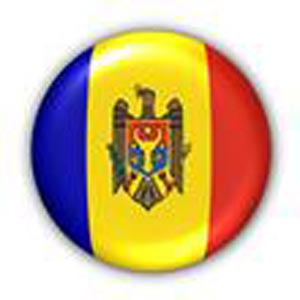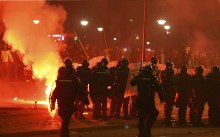Election in Moldova – NATO perspective blocked
Last week-end Moldova had parliamentary elections. The ruling Party of Communists won so no big change in politics is expected. Elections in EU’s border have however some  significance as the new leadership will be the counterpart during period after EP elections influencing e.g. enlargement, partnership and security questions. Before Moldova (FYRO) Macedonia already had their voting and many ways very important elections in Ukraine are coming later.
significance as the new leadership will be the counterpart during period after EP elections influencing e.g. enlargement, partnership and security questions. Before Moldova (FYRO) Macedonia already had their voting and many ways very important elections in Ukraine are coming later.
Moldova is one of the frontlines of “battlefield” of interest spheres between EU and Russia, between U.S. and Russia and between future energy political deals. It is also a test for international law, conflict management and territorial sovereignty.
Elections
As many as 50 per cent of Moldovan eligible voters cast their ballots for the Party of Communists (PCRM). Thus, the ruling party won a landslide victory leaving the other three political parties that made it to parliament far behind. Three other parties managed to pass the 6 per cent threshold required to enter the legislature - the Liberal Democrat Party with 13.9 per cent, the Liberal Party with 13.9 per cent and Our Moldova Alliance with 10 per cent. Liberals have demanded Moldova’s reunification with Romania. All three are in favour of closer ties with the European Union, free-market policies and pursuing NATO membership. The Communists (PCRM) are pro-EU, anti-NATO and less market-friendly.
The other formations failed to clear the six-per-cent threshold. The Social Democratic Party - which proposed (Infotag 20 March 2009) to pass the Transnistrian region to the Russian Federation into a concession for 30 years - grabbed 3.71 per cent of the votes, the Christian Democratic Popular Party 3.02 per cent, the Democratic Party 2.97; the Moldovan Centrist Union 2.76 per cent and the European Action Movement 1 per cent. The other parties and independent candidates mustered less than one per cent.
The Central Election Commission (CEC) has reported voter turnout was 59.52%, i.e. 1,543,966 persons, of whom 14,838 people voted at polling stations opened in foreign countries.
The April 5 parliamentary elections in Moldova met many international standards and commitments, but further improvements are required to ensure an electoral process free from undue administrative interference and to increase public confidence, the International Election Observation Mission said in a statement, on Monday, April 6, at a news conference.
 Transdnistrian question
Transdnistrian question
Moldovans share a linguistic and historical heritage with Romania, but its Transdniestria – aka Pridnestrovie aka Pridnestrovskaia Moldavskaia Respublica (PMR) - region broke away in Soviet times because it feared Moldova would unite with Romania. Most of Moldova was once part of its western neighbour. Transdnistria has practically been independent – if not recognized – state already over 17 years. Short historical representation one may find from here.
On March 18 Russian President Dmitry Medvedev hosted Moldovan President Voronin and Transnistria's President Smirnov at the Barvikha residence near Moscow. The three signed a Russian-drafted joint declaration. Apparently panicking in the run-up to the April 5 elections, Voronin has hoisted the white flag of surrender on Transnistria in return for a pre-election endorsement from the Kremlin. However March 25th he refused to go to Tiraspol for a meeting with Smirnov. A day earlier Transnistrian republic announced slapping a travel ban on a whole number of Western (EU and U.S.) officials. Smirnov stated that this was Tiraspol’s reply to the European Union Council of Ministers’ decision to extend for another 12 months, until February 2010, the travel ban on top Transnistria officials. (Infotag 25.3.2009)
Within the meeting the participants were to evaluate the  functioning of the eight work groups created to elaborate the confidence-building measures between Chisinau and Tiraspol in the social-economic and humanitarian domains and to single out new tasks related to this.
functioning of the eight work groups created to elaborate the confidence-building measures between Chisinau and Tiraspol in the social-economic and humanitarian domains and to single out new tasks related to this.
Post-election protest
Violent protests have broken out in Moldova after the ruling Communist Party was elected on Sunday. About 10,000 - some sources claim over 30,000 - demonstrators gathered on a central square in Moldova's capital Chisinau to protest against the newly elected government. Some had waved European, Romanian and Moldovan flags from the roof of the president's offices.

Some of the protesters are demanding Moldova's reunification with Romania, while others are chanting "Down with the Communists!" Some protesters stormed the Moldovan parliament and presidential office and set fire to furniture. Traffic along the city's thoroughfare has ground to a halt, but police say they have the situation under control. One woman died and about a hundred people were hurt after protesters.
Some possible consequences
Moldova’s parliament will select a new President as Mr Voronin is not eligible according law to be reselected anymore. However he probably will get new influential post – maybe PM or Speaker of Parliament – so his policy will continue. This means no to NATO, no to reunification with Romania, some but not full cooperation with EU, continuing decline of GUUAM (cooperation body supported by US energy giants and military-industrial-complex) and frozen situation with separatist regions.
Talks about solution for Transdnistria/PMR  will probably continue in 2+1 format (Moldova and PMR as parties, Russia mediator), possible result will be delivered to official “western backed” 5 (Moldova/PMR, Russia, Ukraine, OSCE)+2 (U.S. and EU) process.
will probably continue in 2+1 format (Moldova and PMR as parties, Russia mediator), possible result will be delivered to official “western backed” 5 (Moldova/PMR, Russia, Ukraine, OSCE)+2 (U.S. and EU) process.
If the talks are leading to unlikely scenario to pursue the federalization of the Republic of Moldova then also it is expected that the demands of transforming Gagauzia region from autonomy to republic will increase.
Notwithstanding the outcome of Moldova/PMR talks the separatist region will continue its life as state – Transdnistria has all statehood elements, its economy is relatively good with export to over 100 countries and it can manage without UN seat. If EU recognize the reality it could remove the visa ban and start pragmatic cooperation.

More about topic one may find from my earlier articles:
Comments